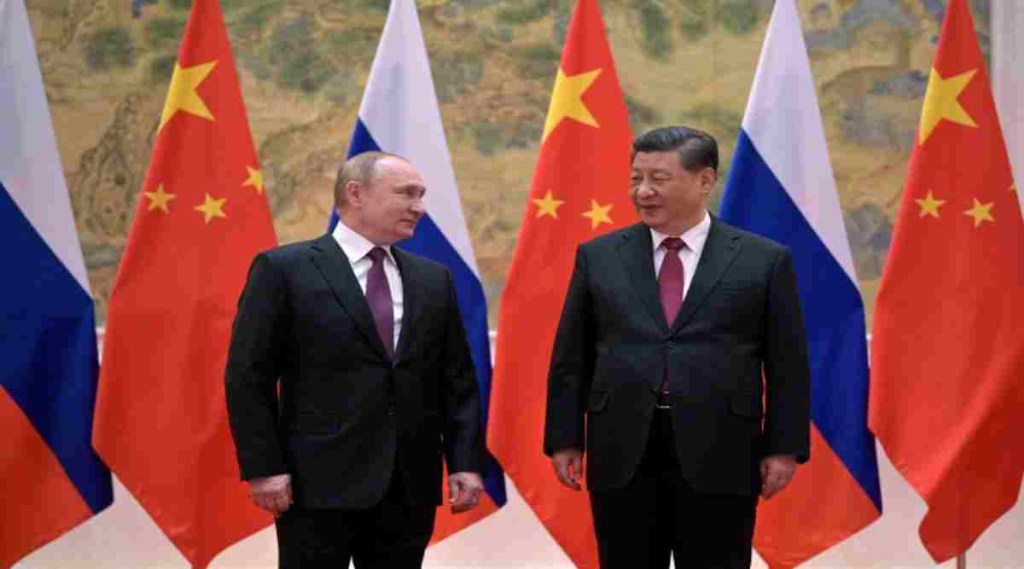By Srikanth Kondapalli
While the current main theatre of intrigue, invasion, war and death remains with that of Russia, Ukraine and the NATO, China’s role is no less insignificant. China stated that it is not “directly concerned” about the evolving escalation in Europe. However, the last few years of Russia-China cooperation has led to bonhomie between the two with implications to the emerging new world order.
Russian invasion of Ukraine is said to have created conditions for the emergence of a new world order. With the intensifications of sanctions, nuclear escalation, popular resistance and possible emergence of proxy war in Ukraine, the European theatre appears to be on the verge of a new cold war. However, Russia-China political coordination for the past two decades had laid the foundation for stabilising the eastern theatre, even though the Indo-Pacific region also exhibited potential conflict scenarios.
Indeed, while China abstained from the Security Council resolution critical of Russian invasion of Ukraine on February 25, many events in the recent past have indicated to their coming together on a number of issues, in a “united front” against the west’s “coloured revolutions”, multipolarity and the eastward march of the NATO. Both made public statements to counter the influence of the United States, although it goes beyond this agenda and creates their own respective spheres of influence.
The fact that China supported Russia not to have a discussion on the situation in Ukraine at the UN Human Rights Council on February 28 indicates both continue to coordinate their positions at the global levels.
The Sino-Russian political coordination is seen in a number of their actions. The first major action of Russia is traced to April 2007 when the cyber-attacks on the Estonian national domains took place, suspected to be the handiwork of certain Russians. This came after “Titan Rain” was alleged to have been executed by China’s military on the US defence contractors in 2003. Both target several countries for intellectual property, military, political and industrial data (as in the case of China) and espionage, infrastructure and influence operations (as in the case of Russia). Leading cyber specialists like Fang Binxing, Lu Wei and Igor Shchyogolev are said to be in touch.
A second major test came when Russia supported Abkhazia and South Ossetia against Georgia, which also combined cyber-attacks and coincided with the Beijing Olympics. The Dushanbe summit of the SCO in August 2008, while expressing “grave concern” called for “peacefully resolve existing problems”. It also expressed “support [for] Russia’s active role in promoting peace and cooperation in the region.” While the then President Medvedev said that the SCO states supported Russia’s actions, China’s foreign ministry stated that it “expresses its concerns about the latest changes in South Ossetia and Abkhazia.”
A few years down the lane, while not mentioning the Crimean annexation, the September 14, 2014 SCO summit at Dushanbe noted “an early restoration of peace in Ukraine and continuation of the negotiation process”, but advocated “independence and sovereignty and territorial integrity” of Afghanistan and Syria. Sino-Russian coordination on Afghanistan and Syria followed soon, while critiquing the US military actions in Iraq and Afghanistan.
Later, at the parliamentary session in March 2018 foreign minister Wang Yi stated that “sky is the limit” for cooperation with Russia. Both renewed the 2001 “strategic partnership” agreement last year and intensified further strategic coordination, trade and investment in the energy fields. Both militaries stepped up arms sales and conducted a series of annual joint exercises since 2005 and including, “peace mission” counter-terrorism and ballistic missile defence exercises.
The Sino-Russian condominium reached its height at the start of the Beijing Winter Olympics when the joint statement between the two leaders on February 4. It mentioned “Friendship between the two States has no limits, there are no ‘forbidden’ areas of cooperation” and called for halting NATO expansion.
At the Putin-Xi meeting, a four-point agreement was concluded, viz., “firm mutual support, strongly support each other in upholding sovereignty, security and development interests, effectively counter external interference and threats to regional security, and maintain international strategic stability.” Both stated that they were “deepening strategic coordination of mutual support and standing shoulder to shoulder” and “will never waver in this choice”.
Interestingly, the Russian invasion of Ukraine took place only after the Winter Olympics came to an end, suggesting some understanding in this regard. So, when the Russian invasion of different parts of Ukraine took place last week, China’s position has been muted or supportive.
China so far appears to be acting in the political margins on many Russian military actions in 2007, 2008, 2014 and the current events in Ukraine with round-about statements. While analysts are debating whether Putin had trapped Xi or the other way round, in the background of Sino-Russian coordination in various global and regional tensions, the messaging is clear – of a symbiotic relationship to set up an alternative order conducive to Moscow and Beijing.
(The author is Professor in Chinese Studies at JNU. Views expressed are personal and do not reflect the official position or policy of Financial Express Online. Reproducing this content without permission is prohibited).

